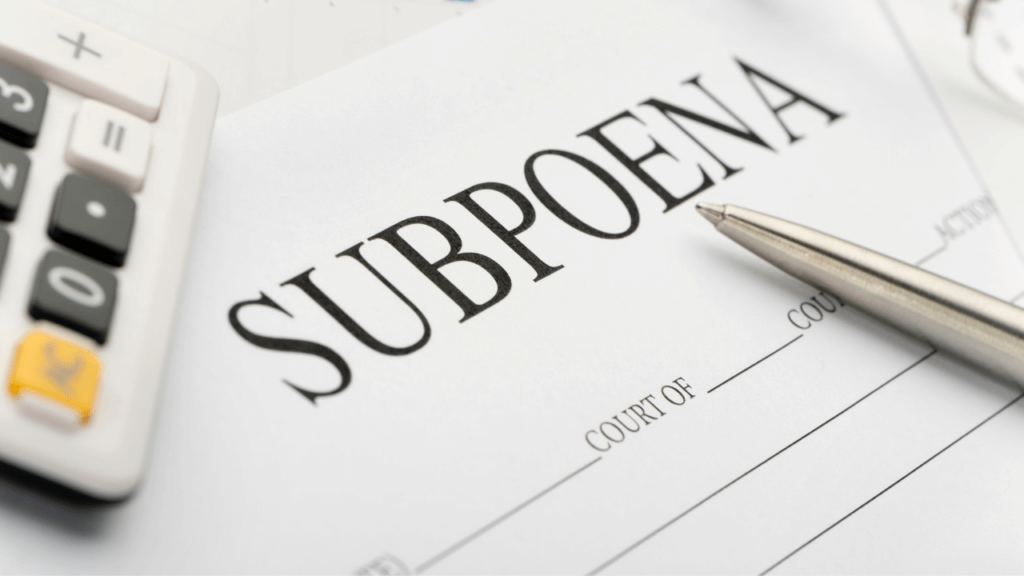
Comcast is the largest internet service provider (ISP) in the United States, keeping businesses and families connected across the country. What does it mean if you have Comcast service in your home or office and receive a copyright infringement subpoena?
An ISP subpoena usually comes with a copyright infringement notice. Typically, this subpoena relates to illegally downloading movies or other copyright-protected digital products.
What Is a Comcast Subpoena, and Why Did I Receive It?
Receiving a Comcast copyright infringement letter and subpoena most often means that a federal copyright infringement lawsuit has been filed. The lawsuit alleges that someone in your home used illegal file-sharing software to download a movie or other digital materials protected by copyright. Comcast is notifying you about the lawsuit because of the activities that happened in your account.
Even though tools such as BitTorrent make it possible to download movies for free, these tools don’t protect users against federal copyright laws. These laws protect original copyrighted works from being copied and distributed without the owner’s permission, such as downloading a movie that you haven’t paid for.
What Happens if You Are Named in a Comcast Subpoena?
A letter and subpoena coming from Comcast will typically inform you that you have between two weeks and 30 days to file a motion or respond. After this period of time, your information will likely be turned over to the plaintiff who filed the lawsuit.
A copyright infringement lawsuit will go through the court process, and there is a possibility that it might be “quashed.” But if the court decides to move forward with the case, it means that your name will be released to the company pursuing the claim.
When your name is released, the movie company may contact you directly. For example, their attorney will likely send a demand letter requesting money in exchange for dropping the lawsuit. Or, you might receive a lawsuit from a movie company (such as Strike 3 Holdings). Or, you could receive both a demand letter and a lawsuit.
Copyright Infringement: Financial and Legal Consequences
You can face serious legal consequences if you are found guilty of copyright infringement. Not only are there financial penalties for damages and profits, but fines can range from between $200 to $150,000 for each instance of infringement. Additionally, the infringer is typically assigned the financial responsibility for paying all court costs and attorney fees. Also, the court will likely impound the illegal works and issue an injunction to stop the infringing acts.
Besides significant financial consequences, there are legal consequences and potential penalties can impact your life in many ways. If found guilty of copyright infringement, jail time is a possibility, and you can have a criminal record that will impact future opportunities.
What Should I Do if I Receive a Comcast Subpoena?
Copyright infringement accusations are not to be taken lightly. While it might be tempting to ignore the letter entirely or plan to deal with it in the future, that doesn’t mean the problem is going away. The most effective solution is to hire a copyright infringement attorney to help you with the case. Generally, you have three options to discuss and weigh with your attorney:
- Anonymous Settlement: Ideally, the goal is to settle the case out of court. Sometimes, there is a possibility of settling it anonymously if Comcast hasn’t yet released your name. You will need to act quickly to handle the situation before the internet service provider shares your name and address with the movie company’s attorneys.
- Motion to Quash the Lawsuit: Another option is to file a request in court called a “motion” to quash or stop the lawsuit. However, there are risks to this option, which is why you should consult with an experienced attorney to determine if this is the right approach.
- Fight it Out in Court: The third option is to build a case and fight the lawsuit in court. A common strategy for defense is to prove that the accused internet user is not the user at the IP address. For example, it might be possible to prove that hackers hijacked your IP address, which means that you aren’t at fault because you didn’t commit copyright infringement.
Contact a Copyright Defense Attorney for Help
If you are facing a Comcast subpoena, the most important thing you can do is call an experienced attorney as soon as possible. Our team at Rosenblum Law is just a phone call away. Call us at your convenience to schedule a consultation: 888-235-9021.
FAQs
Yes, you could be facing serious financial and legal consequences from a copyright lawsuit. If you receive a subpoena, it’s critical that you act quickly and contact an experienced attorney.
Registered copyrights are protected by federal law. If copyright infringement occurs, it means that a copyrighted work has been distributed, performed, reproduced, or publicly displayed without permission from the copyright owner.
The two most common types of copyright infringement include using images and text without permission from the copyright owner. Examples include stock photos, music lyrics, academic writing, movies, music, and more.


